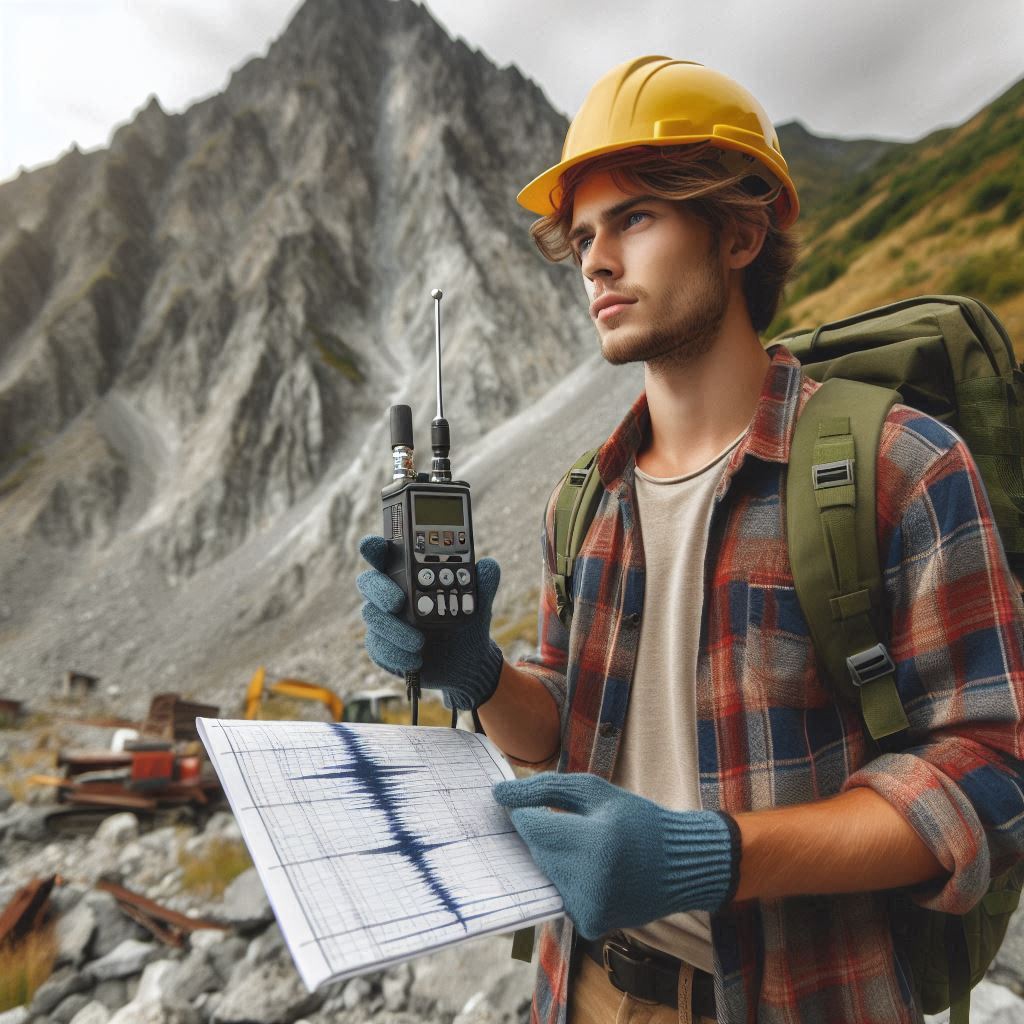Introduction
Seismologists study earthquakes and the seismic waves they generate.
Their work involves analyzing data from instruments that detect ground movement.
By understanding how and why earthquakes occur, seismologists can help predict future seismic activity.
This knowledge is essential for assessing earthquake risks in different regions.
Seismology plays a crucial role in designing safer buildings and infrastructure.
In earthquake-prone areas, engineers rely on seismologists to create structures that can withstand seismic forces.
This collaboration helps minimize damage during an earthquake and protects lives.
Additionally, seismologists contribute to emergency preparedness and response plans.
Their research provides valuable insights into potential earthquake scenarios, helping communities develop effective strategies for disaster response.
Understanding seismic activity also supports public safety initiatives.
With advancements in technology, seismologists can analyze data more efficiently and accurately.
They use sophisticated models to predict future earthquakes, enhancing our ability to mitigate their impacts.
A career in seismology is both challenging and rewarding.
Aspiring seismologists should prepare to make meaningful contributions to society through their expertise in understanding our planet’s dynamic processes.
Research the Role of a Seismologist
Understanding the role of a seismologist is crucial for a successful interview.
Seismologists study earthquakes and seismic waves to understand Earth’s structure and behavior.
They play a vital role in disaster preparedness and risk mitigation.
Here are the primary responsibilities and duties of a seismologist:
Key Responsibilities
- Monitor Earthquakes: Seismologists track seismic activity using specialized equipment.
They analyze data to determine earthquake magnitudes and locations. - Conduct Research: They engage in research projects related to seismic phenomena.
This research helps advance knowledge in geology and geophysics. - Analyze Data: Seismologists interpret seismic data from various sources.
They use statistical methods and modeling techniques for accurate results. - Collaborate with Teams: Seismologists often work with geologists, engineers, and emergency responders.
Collaboration ensures comprehensive disaster response strategies. - Publish Findings: They share research findings through scientific journals and conferences.
Disseminating knowledge helps improve public safety and awareness.
Areas of Specialization
Seismology encompasses various specialized fields.
Familiarizing yourself with these areas can enhance your interview preparation.
Consider exploring the following specializations:
- Earthquake Monitoring: This area focuses on tracking seismic activity and assessing earthquake risks.
It involves using networks of seismometers and other instruments. - Fault Line Studies: Seismologists study fault lines to understand potential earthquake sources.
Analyzing fault mechanics helps predict future seismic events. - Seismic Hazard Assessment: This specialization evaluates earthquake risks in specific regions.
Seismologists analyze geological data to inform urban planning and construction. - Seismological Instrumentation: Experts in this area develop and maintain seismic monitoring equipment.
They ensure that instruments provide accurate and reliable data. - Geophysical Surveys: Seismologists conduct surveys to explore subsurface geological formations.
They use seismic waves to gather information about Earth’s interior.
Preparing for Your Interview
To excel in your interview, focus on these research tips:
- Review Job Descriptions: Analyze job postings to understand required skills and qualifications.
Tailor your preparation to align with these expectations. - Read Relevant Literature: Familiarize yourself with recent studies and advancements in seismology.
Staying informed demonstrates your passion for the field. - Explore Professional Organizations: Join professional groups like the Seismological Society of America.
Networking with professionals can provide valuable insights into the industry. - Practice Your Responses: Prepare answers to common interview questions related to seismology.
Practicing responses will boost your confidence during the interview. - Stay Updated on Current Events: Keep track of recent seismic events and advancements in technology.
Discussing current events can showcase your enthusiasm for the field.
By thoroughly researching the role of a seismologist, you can present yourself as a knowledgeable candidate.
Understanding responsibilities and areas of specialization will help you stand out in interviews.
Prepare well, and you’ll be on your way to a successful career in seismology.
Read: Challenges and Rewards: The Dual Life of an U.S. Environmental Scientist
Develop Technical Skills
Aspiring seismologists must develop strong technical skills to succeed in their careers.
A solid foundation in seismology involves hands-on experience and software proficiency.
Here are some essential tips to enhance your technical skills.
Gain Experience in Using Seismograph Equipment
Start by gaining practical experience with seismograph equipment.
Seek internships or volunteer positions at universities or research organizations.
Hands-on experience will help you understand equipment setup and operation.
Familiarize yourself with various types of seismographs, including broadband and strong-motion sensors.
Practice using the equipment in different environments, such as labs and field locations.
This experience will boost your confidence in real-world settings.
Participate in research projects that involve data collection using seismographs.
Collaborating with experienced professionals can provide invaluable insights and tips.
Learn How to Interpret Seismic Data and Graphs
Interpreting seismic data is crucial for seismologists.
Enroll in courses focused on seismic data analysis.
These courses will teach you to read and understand seismic waves, waveforms, and other key parameters.
Develop your analytical skills by working with real datasets.
Use academic resources, such as textbooks and online materials, to deepen your understanding.
Pay attention to the various types of seismic waves, including P-waves and S-waves.
Learn how to identify characteristics of seismic events, such as magnitude and depth.
Regularly practice analyzing seismic graphs to strengthen your skills.
Familiarize yourself with different graph formats, such as time-series and spectrograms.
This practice will help you visualize seismic events effectively.
Familiarize Yourself with Seismic Software and Tools
Familiarizing yourself with seismic software is essential for modern seismology.
Research popular software tools used in seismic analysis, such as MATLAB, Seismic Unix, and ObsPy.
Take online courses or tutorials to learn how to use these programs effectively.
Practice using software to analyze seismic data and generate visualizations.
Create graphs and models based on real datasets to build your confidence.
Familiarity with seismic software will enhance your ability to conduct research and present findings.
Join forums and communities dedicated to seismology software.
Engaging with other professionals will help you learn new tips and techniques.
Consider contributing to open-source projects to gain additional experience and exposure.
Developing technical skills is vital for aspiring seismologists.
Gain experience with seismograph equipment, interpret seismic data, and familiarize yourself with software tools.
By focusing on these areas, you will position yourself as a competent candidate in the seismology field.
Building these skills will prepare you for success in your future career.
Read: Job Market Trends: Future of Chemistry Jobs in America
Gain Field Experience
Gaining field experience is essential for aspiring seismologists.
Practical knowledge enhances your understanding of seismic data collection and analysis.
Here are key ways to gain valuable field experience:
Participate in Internships or Volunteer Opportunities
- Seek Internships: Look for internships with universities or research institutions focused on seismology.
- Volunteer: Offer your time to organizations conducting seismic research.
Volunteering can lead to hands-on experience. - Network: Connect with professionals in the field through conferences and social media.
Networking often leads to internship opportunities. - Leverage Academic Resources: Utilize your university‘s career services.
They can help you find internships related to seismology.
Attend Fieldwork Trips
- Join Field Trips: Participate in organized fieldwork trips.
These trips often take you to earthquake-prone areas. - Learn from Experts: Field trips allow you to learn from experienced seismologists.
Observe their techniques and ask questions. - Experience Real-World Conditions: Fieldwork exposes you to real seismic conditions.
You can better understand how earthquakes affect various regions. - Collaborate with Peers: Working alongside fellow students enhances your learning experience.
Collaboration fosters teamwork and knowledge-sharing.
Learn Data Collection and Analysis Techniques
- Understand Data Collection Methods: Familiarize yourself with the tools used in seismology.
Learn how to deploy seismographs and other instruments. - Practice Data Analysis: Gain experience in analyzing seismic data.
Use software tools commonly employed in the field. - Study Geophysical Techniques: Learn various geophysical methods for assessing seismic activity.
Techniques like ground penetrating radar (GPR) and magnetometry can be beneficial. - Take Field Courses: Enroll in field courses offered by universities.
These courses often provide hands-on training in data collection and analysis. - Seek Guidance: Find a mentor in the field.
They can provide insights and guidance on data collection and analysis practices.
Gaining field experience is crucial for aspiring seismologists.
Engage in internships and volunteer opportunities.
Attend fieldwork trips to gain real-world experience.
Learn how to collect and analyze seismic data effectively.
This experience not only enhances your skills but also boosts your employability.
Embrace every opportunity to learn and grow in the field of seismology.
Read: Challenges and Rewards: Navigating the Chemist Career Path

Network with Professionals
Networking with professionals is vital for building a successful career in seismology.
By connecting with seasoned experts, you gain valuable insights and open new opportunities.
Here are some effective strategies for networking in the seismology field.
Attend Seismology Conferences and Workshops
Attending seismology conferences and workshops offers an excellent way to network.
These events gather experts, researchers, and students from around the world.
Participate actively in discussions, ask insightful questions, and engage with fellow attendees.
This interaction expands your professional network and fosters meaningful relationships.
Workshops often include hands-on activities, allowing you to learn directly from experienced professionals.
Use these opportunities to showcase your skills and knowledge.
Discuss your research interests and seek advice on your work.
Your active involvement can leave a positive impression and lead to future collaborations.
Connect on LinkedIn
LinkedIn serves as a powerful networking tool across various industries, including seismology.
Create a compelling profile highlighting your academic background, research interests, and career goals.
Use a professional photo and write a strong summary that reflects your passion for seismology.
Connect with experienced seismologists, researchers, and industry leaders.
Personalize your connection requests to make a lasting impact.
Engage with their posts by liking, commenting, and sharing your insights.
Participate in relevant discussions to showcase your expertise and knowledge.
Join LinkedIn groups focused on seismology to further expand your network.
Share articles, resources, and updates about your projects.
These actions demonstrate your commitment to the field and can attract attention from potential mentors or collaborators.
Seek Mentorship
Mentorship can significantly shape your career as a seismologist.
Seek established professionals willing to offer guidance and support.
A mentor can provide valuable insights, help navigate challenges, and introduce you to new opportunities.
When approaching potential mentors, be clear about your goals and aspirations.
Explain how their experience aligns with your career objectives.
Show genuine interest in their work and ask thoughtful questions.
This approach demonstrates respect for their time and expertise.
Be open to their feedback and guidance.
Mentorship often involves constructive criticism and suggestions for improvement.
Embrace these insights as opportunities for growth.
Building a strong mentor-mentee relationship can lead to lasting connections in the industry.
Overall, networking with professionals in the seismology field is essential for career advancement.
It helps you stay updated on the latest trends and expands your knowledge base.
Building meaningful connections can significantly benefit your long-term career.
Take advantage of networking opportunities at conferences, online platforms like LinkedIn, and through mentorship.
Be proactive in your approach, engage with experts, and foster relationships that support your growth.
By investing time in networking, you can enhance your career in seismology and create a foundation for future success.
Read: Diverse Career Paths: From Chemist to Patent Attorney in the US
Transform Your Career Today
Unlock a personalized career strategy that drives real results. Get tailored advice and a roadmap designed just for you.
Start NowPrepare for Interviews
Preparing for interviews is crucial for aspiring seismologists.
It allows you to present your best self.
Follow these tips to increase your chances of success.
Research the Company or Organization
Begin your preparation by researching the company or organization.
Understand their mission, values, and recent projects.
Look into their contributions to seismology and related fields.
Familiarize yourself with their key personnel, including department heads.
Knowing this information helps you connect during the interview.
Tailor your answers to align with their goals and culture.
This demonstrates your genuine interest and dedication.
You can even mention specific projects during your interview.
This shows you are well-informed and engaged.
Practice Answering Common Seismology-Related Questions
Next, practice answering common seismology-related questions.
Review typical interview questions for seismologists.
Questions may include topics like seismic data analysis and earthquake engineering.
Practice articulating your answers clearly and concisely.
Mock interviews with friends or mentors can help you gain confidence.
Record yourself to evaluate your body language and tone.
Focus on maintaining eye contact and a positive demeanor.
These small details make a significant impact during your interview.
Prepare for both technical questions and behavioral questions.
For example, be ready to discuss your experience with seismic equipment.
Highlight your familiarity with data interpretation and software tools.
Highlight Your Technical Skills
During the interview, emphasize your technical skills and relevant experience.
Showcase your proficiency with seismic analysis tools and techniques.
If you have experience in fieldwork, discuss specific projects.
Describe your role and contributions to the success of those projects.
Discuss your familiarity with software programs like MATLAB or SeisComp.
Employers value hands-on experience in seismology.
Provide examples of how you have applied your skills in practical settings.
Use the STAR method (Situation, Task, Action, Result) to structure your responses.
This method provides clarity and showcases your problem-solving abilities.
Show Enthusiasm and Curiosity
Don‘t forget to express your enthusiasm for the field.
Seismology is an ever-evolving discipline.
Show your curiosity about the latest developments and technologies.
Ask thoughtful questions about the organization’s current projects.
This indicates your commitment to ongoing learning and growth.
Your enthusiasm can set you apart from other candidates.
Preparing effectively for interviews can make a significant difference.
By researching the organization, practicing common questions, and highlighting your skills, you will shine.
Approach your interview with confidence and enthusiasm.
You are ready to take the next step in your seismology career!
Showcase Your Passion for Seismology
Passion can set you apart in an interview for a seismology position.
Employers value candidates who show genuine enthusiasm for the field.
Here are key ways to showcase your passion during the interview process.
Demonstrate Your Enthusiasm
From the moment the interview begins, convey your excitement for seismology.
Use positive language that reflects your enthusiasm.
Speak with energy and confidence about your experiences and knowledge.
This approach captures the interviewer‘s attention and leaves a lasting impression.
Share Personal Projects
Discuss any personal projects or research related to seismology.
Highlighting your involvement in such activities showcases your initiative.
For example, if you conducted a project on earthquake patterns, explain your findings.
Mention any tools or methods you used during your research.
This demonstrates your hands-on experience and commitment to the field.
Explain Your Motivation
Articulate why you are passionate about studying earthquakes and seismic activity.
Consider discussing your fascination with the natural world.
Explain how understanding seismic activity contributes to public safety.
This context helps interviewers connect with your passion on a deeper level.
Relate Experiences to Seismology
Link your experiences to your interest in seismology.
If you have traveled to earthquake-prone regions, share those stories.
Discuss what you learned from those experiences.
This approach demonstrates your dedication to understanding seismic phenomena.
Discuss Future Aspirations
Talk about your career goals within the field of seismology.
Explain how you plan to contribute to advancements in earthquake research.
Employers appreciate candidates who have a clear vision for their future.
It reflects a proactive attitude and a commitment to making an impact.
Prepare Thoughtful Questions
Prepare thoughtful questions to ask your interviewers.
Inquire about current research projects or future initiatives in their organization.
Showing interest in their work indicates your enthusiasm for collaboration and learning.
This can foster a positive dialogue and enhance your candidacy.
Showcasing your passion for seismology is vital during the interview process.
Demonstrate enthusiasm, share relevant projects, and explain your motivation clearly.
Relate your experiences to the field, discuss future aspirations, and ask insightful questions.
This approach will help you make a memorable impression on potential employers.
Passionate candidates often stand out in competitive job markets, so let your enthusiasm shine.
Learn More: Impact of Zoologists on Wildlife Conservation Efforts
See Related Content: Notable Materials Scientists You Should Know
Ask Thoughtful Questions
Asking thoughtful questions during your interview can set you apart as an aspiring seismologist.
This approach demonstrates your curiosity and engagement in the field.
Here are some strategies to formulate meaningful inquiries.
Prepare Questions About Seismology Projects
Research the company‘s current seismology projects before the interview.
This preparation shows your interest and initiative.
Consider asking:
- What are the company‘s major ongoing seismology projects.
This question allows you to understand their focus areas. - How does the company incorporate new technology in its projects.
Inquiring about technology demonstrates your awareness of industry advancements. - Can you describe the team dynamics in the seismology department.
This helps you gauge the work environment and collaboration opportunities.
Inquire About Growth and Development
Expressing interest in personal and professional growth can impress your interviewer.
Consider these questions:
- What opportunities for professional development does the company offer?
This shows your eagerness to learn and advance in your career. - How does the company support continued education for seismologists?
This question reflects your commitment to lifelong learning. - Are there mentorship programs available within the seismology team?
Mentorship can provide invaluable guidance as you start your career.
Show Curiosity About the Field
Demonstrating your curiosity about seismology can highlight your passion.
Here are some insightful questions:
- What are the biggest challenges currently facing the seismology industry?
This question shows that you understand the complexities of the field. - How does the company approach research and development in seismology?
This inquiry reveals your interest in innovation and scientific inquiry. - Can you share any recent findings that have impacted your projects?
Asking about recent findings shows you are up to date with current research.
Wrap Up With Enthusiasm
Finally, express your excitement about the potential opportunity.
Let the interviewer know you appreciate their insights. You might say:
- Thank you for sharing your experiences. I am eager to contribute to such impactful work.
This statement leaves a positive impression and reiterates your interest.
Asking thoughtful questions during your interview enhances your profile as a candidate.
It showcases your preparedness, eagerness to learn, and genuine interest in seismology.
Use these strategies to engage effectively with your interviewer.
This approach will help you stand out in a competitive field and demonstrate your potential as a seismologist.
Transform Your Career Today
Unlock a personalized career strategy that drives real results. Get tailored advice and a roadmap designed just for you.
Start NowGain More Insights: Materials Science vs. Other Science Disciplines
Conclusion
Seismology plays a crucial role in understanding earthquakes and their impacts.
By studying seismic waves, scientists can predict seismic activity and enhance public safety.
This research is vital for developing early warning systems and improving building codes.
Aspiring seismologists should remain committed to their passion for this field.
The knowledge gained through education and hands-on experience will significantly strengthen their expertise.
Preparing for interviews is essential for career advancement in seismology.
Strong interview skills can set candidates apart in a competitive job market.
Practice common interview questions and develop your ability to communicate complex concepts clearly.
Additionally, networking with industry professionals can provide valuable insights and opportunities.
Attend conferences, workshops, and seminars to connect with established experts.
Engage in relevant discussions and actively seek mentorship.
Seek out opportunities to collaborate on research projects.
Join professional organizations to expand your network.
Embrace every chance to learn and grow within the seismology community.
The field is ever-evolving, and your contributions can significantly impact society.
Stay curious and dedicated as you pursue your dreams in this vital science.
Your work can help safeguard communities against the effects of earthquakes and advance our understanding of seismic phenomena.




